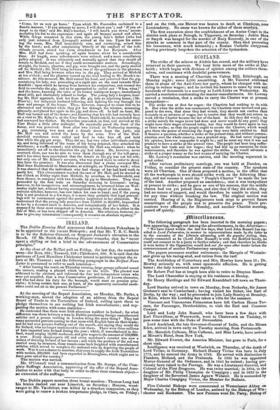SCOTLAND.
The strike of the miners at Airdrie has ceased, and the military have returned to their quarters. We hear little more of the strike at Dal- keith ; which began with division of opinion among the colliers them- selves, and continues with doubtful perseverance.
There was a meeting of Chartists on Calton Hill, Edinburgh, on Monday night; some 5,000 assembling. A Mr. Tancred addressed them in abuse of the Anti-Corn-law party, whom he charged with de- siring to reduce 'wages; and he invited his hearers to come by tens and hundreds of thousands to a meeting at Leith Links on Wednesday. He carried a resolution condemning the master-manufacturers. Mr. Lowrey moved a resolution, that a strike to carry the Charter was at present inexpedient—
The strike was at first for wages : the Chartists had nothing to do with it. But when the strike was commenced, the Chartists came forward and pro- posed to the men, that since they had struck, they should not confine their demands to an advance of wages, but to resolve that they would not return to work till the Charter became the law of the land. In this they did wisely ; for a strike merely for wages never had done and never would do any good: they might have their wages advanced today, but they would be down again in two or three weeks; so that the people ought to secure the Charter, which would give them the power of retaining the wages they were fairly entitled to. Still it became a question, whether a strike at the present time, and without commu- nication over the whole country, was a prudent step. He bad never disguised his opinion, however unpopular it might be ; and he must say that it was not prudent to have a strike at the present time. The people had been long suffer- ing under bad trade and low wages ; they had laid up no resources for their maintenance, and therefore he was against the strike. He would advocate a strike at a proper season as the best means of carrying the Charter.
Mr. Lowrey's resolution was carried, and the meeting separated in good order. After various preliminary meetings, one was held at Dundee, on Friday, to consider the present state of the country. The speakers were all Chartists. One of them proposed a motion, to the effect that all the workpeople in town should strike work on the following Mon- day, and not resume it until the " People's Charter" be made the law of the land. Another proposed an amendment, tnat at was inexpedient at present to strike ; and he gave as one of his reasons, that the middle classes had not yet joined them, and also that if they did strike, they had no means of support, and would therefore be unable to stand out for any time without breaking the law. The original motion was carried. Hearing of it, the Magistrates took steps to prevent future assemblages of the people and to preserve the peace. Their pre- cautions were effectual; for Monday, and another Chartist meetings passed off quietly.


























 Previous page
Previous page